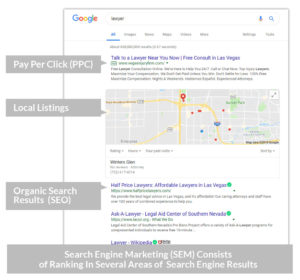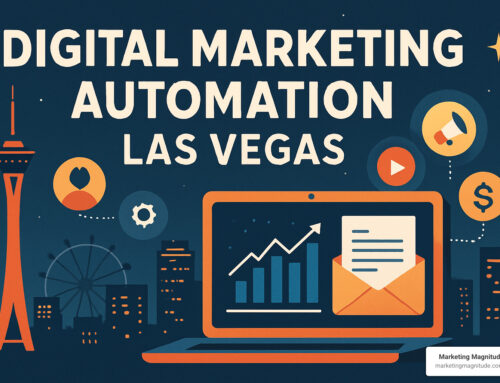The world of digital marketing can seem stuffed with confusing terminologies. To make matters worse, innovators create new technology and marketing techniques every day, ushering new terms and definitions into the industry.

Search Engine Optimization (SEO) and Search Engine Marketing (SEM) aren’t exactly new concepts, but to newcomers, they can be confusing, especially because SEO and SEM are often used interchangeably. But what do they mean?
What Do SEM and SEO Mean?
Search Engine Marketing is a general, umbrella term for any practice designed to increase a site’s visibility on search engines. Some tactics might include pay per click (PPC) advertising, local listings, or search engine optimization.
Search Engine Optimization, in comparison, refers to a subset of search engine marketing. Search engine optimization in the process of increasing the number of visitors to a particular website through search engines. This is done by making that site appears as high as possible on the organic list of results generated by a search engine. In other words, SEO aims to make a website appear near the top of a results list when someone enters a keyword search.
Search engine optimization is achieved through a variety of processes, including on-page and off-page efforts like:
- Incorporating relevant keywords into title tags, heading tags, meta descriptions, and blog post content
- Organizing site navigation to be more user and Google-friendly
- Improving page load speed
- Incorporating local keywords
- Building backlinks
What’s the Difference?
Essentially, SEM tactics seek to increase overall website visibility on search engines. In comparison, SEO tactics seek to increase website visibility specifically through moving up a search engine’s rankings in the organic area. Though SEM and SEO go hand and hand, they are not the same term.
Which is More Important?
Clearly, these nearly inseparable processes are both important. Many digital marketing experts argue about which aspect of search engine marketing is most essential to boosting website visibility, and ultimately, to boosting profit. According to study by HubSpot, 70-80% of search engine users are only focusing on the organic results, which leaves the remaining 20-30% clicking on ads or taking another action. However, SEO organic search rankings take time and on-going effort to rank for each keyword that you are targeting. With a PPC campaign, you can target as many keywords as you would like and be up within the same day. Also included in PPC campaigns is the ability to advertise on Social Media Networks which further expands the company’s reach.
Every company should have a long-term SEO strategy that will constantly increase their rankings through the years. However, sometimes businesses need quicker results. This is why effective digital marketing tactic depend on the business in question and their specific goals. When running a PPC campaign in addition to an SEO campaign, a business can compete with search engine results that are extremely competitive. When running a PPC campaign, ads are served right along with companies who have dominated the search engines for years. In addition, company with a young, pop-culture-loving market might benefit more from social media ads, while a technical or mechanical company might rely on blog posts to educate and engage customers.
Ultimately, the landscape of the internet and digital marketing industry is constantly changing. Mobile search was practically non-existant 10 years ago, but now mobile devices make up roughly 52% of paid search click volume. Instead of trying to find the “best” strategy, focus on changing with the times and using a digital marketing strategy that makes sense for your unique brand.
For more great tips about SEM and SEO, contact Marketing Magnitude today!




